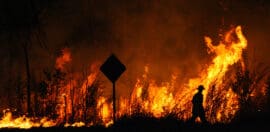Greenies and miners don't need to be at war

13 November 2019 at 5:47 pm
Miners are not the enemy. In fact, those who once worked in mining are a key element to implementing the change required, writes Tim Hutton.
Recently, as I perused the cover of a local news rag, I spotted an article lamenting state government decisions that were “endangering” the jobs of coal miners. In this article was a substantial presupposition: that coal jobs are worth saving.
It is undeniable that, for better and worse, our society would not be where it is today without fossil fuels. Coal and petroleum-based products have, for many generations now, powered our society and allowed us to reach vast technological heights. What we have developed since the 1800s would have seemed, to pre-industrial societies, to be like magic.
Despite this, there is also no denying that coal-fired power stations are antiquated. Coal-fired power is, in fact, worse than some benign vestigial hangover; it is slowly-but-surely destroying our planet. Even if we take into account so-called “clean” coal technology, it would be lunacy to continue burning our finite fossil fuels when we have cheaper, cleaner, and more quickly-dispatched options (that we won’t eventually run out of). We have a moral obligation to act decisively in moving away from coal-fired power and to renewables as we rapidly approach key climate tipping points.
One of Australia’s biggest impediments in this regard is the persistent myth that subsidising coal mines is the only way to pump life back into dying rural communities. This is not the case, even though the myth strongly contributed to the Coalition’s narrow victory in Queensland during the last federal election (specifically with relation to the Adani mine). While mining’s contribution to our economy is not insignificant, all mining still constitutes less than 10 per cent of Australia’s GDP. Thermal coal mining is a further fraction of this.
It is important to note that, in this discussion, miners are not the enemy. In fact, those who once worked in mining are a key element to implementing the change required. After all, renewable energy isn’t going to build and maintain itself. Our existing coal-fired power stations are starting to reach the end of their life cycle – some sooner than planned – and many countries are rapidly divesting from coal. Subsequently, we owe it to our nation’s workers to act responsibly and plan for the future.
This won’t be easy; we will have to completely rethink our power grid. Instead of a highly-centralised model, where we receive nearly all of our power from huge power stations, the network will have to become more distributed. Individuals and local communities will have to produce more of their own power, and intelligent storage options will need to be rolled out for when the wind is low and the sky is cloudy.
We will also, likely, have to renationalise the energy grid (either in full or in part). This is, of course, going to be neither cheap nor simple. It will also require a lot of workers in newly created jobs. We must, however, at least start the planning for how we can transition those who work in coal-related industries to a post-coal energy sector.
“We need to reframe the climate crisis as an opportunity which provides incitement to phase out dying technology and create jobs through necessary infrastructure projects.”
And this is where the government comes in. Though all of this seems complicated, it is not an insurmountable task. There are already discussions taking place and models in existence for how to rapidly scale up renewables. Unfortunately, there is little incentive in the private sector for this rapid change (and indeed, incentive to resist it for many). Subsequently, we need our governments to mobilise their resources to create jobs that will build and sustain this renewable infrastructure.
There is also some great research being done specifically into decarbonising an economy without harming rural centres. Again, this isn’t going to be easy. It will involve a conscious and collaborative effort between industry, employees, unions, and governments to provide outcomes that meet the needs of our communities.
The voices of these mining communities must also be more than token representation, lest they suffer from the eventual closure of mines. However, if parties like the Greens are to be believed, a switch to renewables could generate over a hundred thousand new jobs. Even if only a fraction of these jobs come to exist, it provides a viable alternative to the status quo. We must stop fetishising the free market and realise that, in fact, government might be the solution.
This may seem expensive at first glance, but if the kinds of subsidies we are providing to mining and tax cuts to big business were redirected to renewable projects, substantial transition is just a matter of will and planning, not resources.
There is a saying in business and politics: “no good leader wastes a crisis”. Though dripping with cynicism, this adage holds a grain of truth. Instead of seeing the climate crisis as a war between miners and greenies, we need to reframe it as an opportunity which provides incitement to phase out dying technology and create jobs through necessary infrastructure projects.
Obviously, we aren’t going to be able to shut down every coal mine immediately, especially those that produce metallurgical or coking coal (for which mass-market alternatives are still a little way off). The longer we put it off, though, the less time we will have to act, and the more people get hurt in the transition. Transitioning sooner rather than later also has the added benefit of helping to avert the end of life as we know it, which is pretty important too, I guess.
About the author: Tim Hutton is a teacher, masters student and freelance writer based in Brisbane. He writes on politics, education, media, societal issues, and the intersection of all of the above.
This article was first published on Eureka Street.









It is time our Governments seriously considered and began building/implementing nuclear power.